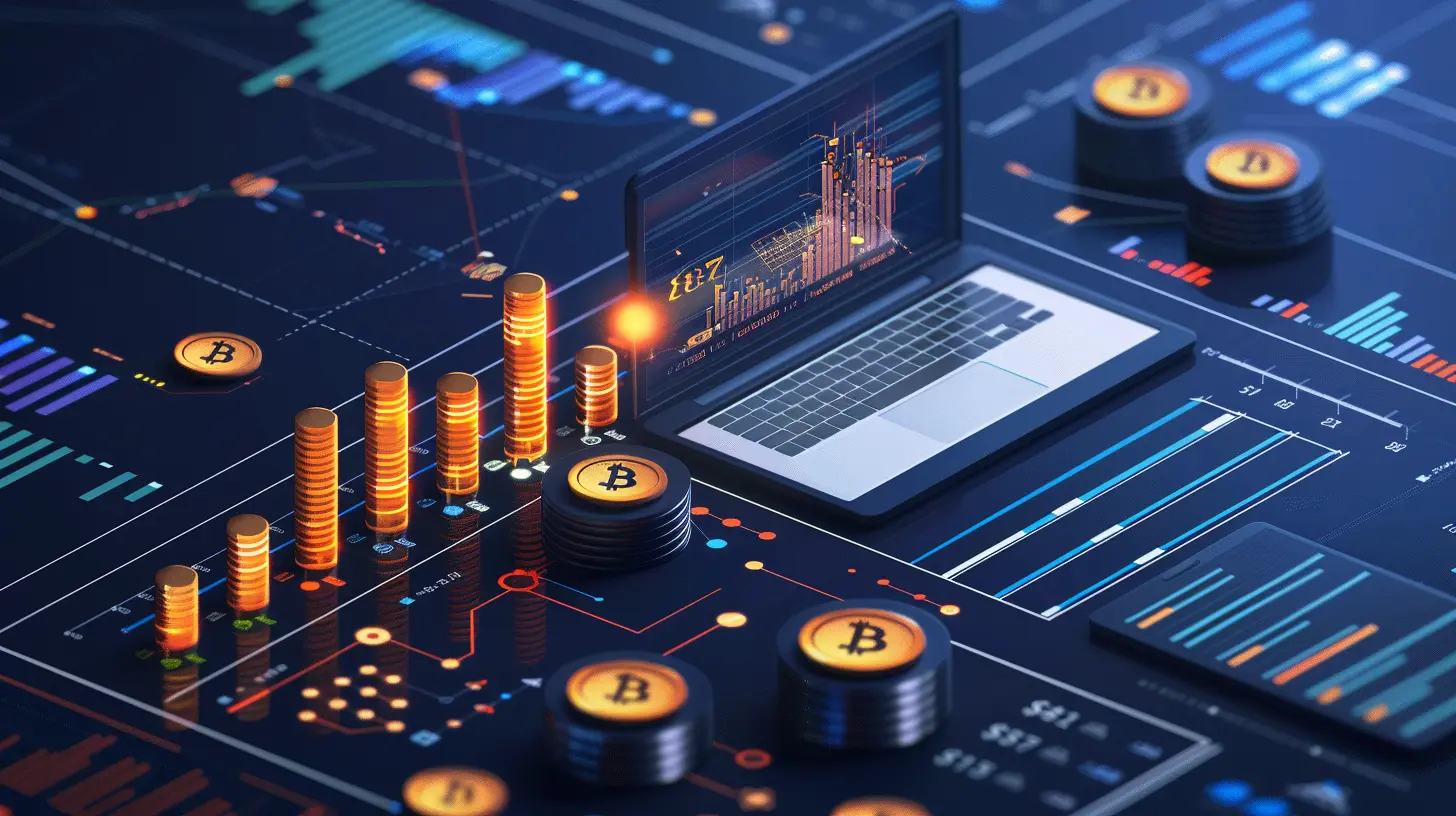The Role of Blockchain in Decentralized Finance (DeFi)
5 September 2025
Blockchain technology has been buzzing around for more than a decade now, and unless you've been living under a rock, you've probably heard of it. But what if I told you that blockchain is not just about cryptocurrencies like Bitcoin or Ethereum? In fact, one of the most game-changing applications of blockchain is its role in Decentralized Finance, or DeFi for short.
So, what is DeFi? And how does blockchain fit into this revolutionary financial system? Let’s dive right in and explore how blockchain is reshaping the world of finance, giving power back to the people, and, quite frankly, shaking things up in ways we never imagined.

What is Decentralized Finance (DeFi)?
Before we can appreciate the role of blockchain in DeFi, we first need to understand what DeFi itself is. Decentralized Finance, or DeFi, refers to a new kind of financial system that operates on decentralized networks, specifically using blockchain technology.At its core, DeFi aims to recreate traditional financial systems—like lending, borrowing, and trading—but without the middlemen like banks and other financial institutions. In other words, DeFi offers financial services that are open, permissionless, and easily accessible to anyone with an internet connection. No need for a bank teller or a credit score.
Imagine being able to lend your money, earn interest, or even take out a loan without dealing with a bank. Sounds pretty futuristic, right? Well, the future is now, and blockchain is the driving force behind it.

The Blockchain Foundation
Blockchain is essentially the backbone of DeFi. But what exactly is blockchain? In simple terms, it’s a decentralized, distributed ledger that records transactions across many computers. This ensures that the data, once recorded, is secure, transparent, and immutable.Think of blockchain as a digital ledger book that can’t be tampered with. Every time a transaction occurs, it gets recorded in this ledger, and once it's there, it can't be altered without changing every single record on the network—which is practically impossible.
This decentralized nature is what makes blockchain perfect for DeFi. Since no single entity controls the blockchain, it’s transparent, secure, and, most importantly, trustless. You don’t have to trust a bank or a third-party institution because the system itself ensures that everything is above board.

How Blockchain Powers DeFi
1. Transparency and Security
One of the biggest selling points of blockchain technology is its transparency. Every transaction made on a blockchain is visible to everyone on the network. This kind of openness is unheard of in the traditional financial world, where banks and institutions keep their ledgers private.In the decentralized world, transparency is key. You can see where money is going, how it's being used, and what kind of transactions are happening—all in real-time. That means you don’t have to trust a central authority like a bank; instead, you can trust the network.
And let’s not forget security. Blockchain’s decentralized structure makes it incredibly resistant to hacks and fraud. Since the ledger is spread across multiple nodes (computers), a hacker would need to compromise an astronomical number of computers at the same time to alter the data.
2. Smart Contracts: The Heart of DeFi
If blockchain is the backbone of DeFi, then smart contracts are the heart. Smart contracts are automated contracts that execute themselves when certain conditions are met. They are self-operating and eliminate the need for a middleman.Let me break it down: Imagine you and a friend make a bet on a sports game. You both agree to put some money in, and the winner gets the pot. Normally, you’d need a trusted third party to hold the money until the game is over, right? With smart contracts, you don’t need anyone. The contract itself holds the money and automatically releases it to the winner once the game ends.
In DeFi, smart contracts handle all sorts of financial agreements, from lending and borrowing to insurance and trading. They enable decentralized platforms to offer financial services without needing banks or other intermediaries.
3. Permissionless and Global Access
One of the most revolutionary aspects of DeFi is that it’s permissionless. In the traditional financial system, you need permission to do almost anything. Want a loan? You need to apply and get approved. Want to trade stocks? You need to go through a broker.In the world of DeFi, anyone can participate. There are no gatekeepers. All you need is an internet connection and a crypto wallet, and you’re good to go. This opens up financial services to millions of people worldwide who don’t have access to traditional banking systems.
And because DeFi is built on blockchain, it’s global. Someone in a remote village in Africa can interact with the same DeFi platform as someone sitting in a skyscraper in New York City. The playing field is leveled in ways that we’ve never seen before.
4. Decentralized Exchanges (DEXs)
Decentralized exchanges, or DEXs, are one of the cornerstones of the DeFi ecosystem. These platforms allow users to trade cryptocurrencies without needing a centralized exchange like Coinbase or Binance.In a traditional exchange, you need to deposit your funds into the platform, and then the platform facilitates the trade. But in a DEX, you keep control of your assets, and the trades happen directly between users, thanks to—you guessed it—smart contracts.
This eliminates the need for a middleman and reduces the risk of hacks or fraud because your assets are never in the control of a centralized entity. Plus, DEXs operate 24/7, so you can trade anytime, anywhere, no banker’s hours here.
5. Yield Farming and Liquidity Pools
If you’ve heard about people making crazy returns in DeFi, chances are they were involved in something called yield farming or liquidity pooling. These are two of the hottest trends in DeFi right now, and they’re powered entirely by blockchain.In yield farming, users lend their crypto assets to DeFi platforms in exchange for interest or rewards. Liquidity pools, on the other hand, are collections of funds locked in a smart contract that provide liquidity for decentralized exchanges. Users who contribute to these pools are rewarded with a portion of the transaction fees.
Both of these mechanisms are made possible by blockchain’s transparency and automation. Without the need for intermediaries, users can earn higher returns than they would in traditional savings accounts or investment portfolios.
6. Tokenization of Assets
Another way blockchain is transforming finance is through the tokenization of assets. In DeFi, virtually anything can be tokenized—stocks, real estate, art, you name it. Tokenization allows real-world assets to be represented and traded on the blockchain in the form of digital tokens.This opens up new possibilities for fractional ownership and increased liquidity. For example, instead of needing $100,000 to buy a piece of property, you could own a fraction of it by purchasing tokens that represent a share of that property.
Blockchain ensures that these tokens are secure, transparent, and easily transferable, making it easier than ever to invest in assets that were previously out of reach for the average person.

Challenges and Risks in DeFi
As exciting as DeFi and blockchain are, they’re not without their challenges. One of the biggest risks in DeFi is the potential for smart contract bugs or vulnerabilities. Since smart contracts are code, they can sometimes have flaws that can be exploited by hackers.Regulation is another issue. While DeFi is largely unregulated right now, that may not be the case forever. Governments around the world are starting to take notice, and it’s likely that regulations will come into play at some point. Whether that’s a good or bad thing depends on your perspective.
Lastly, DeFi is still in its early stages, and the user experience can be complicated. Navigating DeFi platforms requires a level of technical knowledge that can be daunting for newcomers. However, as the technology matures, we can expect these platforms to become more user-friendly.
The Future of Blockchain and DeFi
So, what does the future hold for blockchain and DeFi? If the current trajectory is any indication, the sky’s the limit. DeFi is already disrupting traditional finance in ways we never thought possible, and it’s only going to keep growing.As blockchain technology continues to evolve, we’ll likely see even more innovative applications in the DeFi space, from decentralized insurance to programmable money and beyond. And while there are challenges to overcome, the potential for a more open, transparent, and accessible financial system is too great to ignore.
In short, blockchain is the engine driving the DeFi revolution, and we’re just getting started.
all images in this post were generated using AI tools
Category:
Blockchain TechnologyAuthor:

Reese McQuillan
Discussion
rate this article
1 comments
Fleur Bishop
Blockchain revolutionizes finance; transparency ensured.
September 8, 2025 at 11:47 AM

Reese McQuillan
Thank you! Indeed, blockchain enhances transparency and security in finance, making DeFi more accessible and trustworthy.


